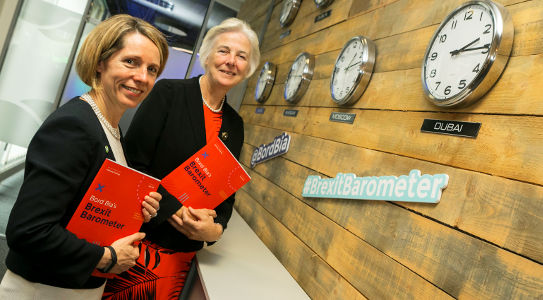‘Brexit can be a catalyst for positive changes’ Bord Bia CEO
A new report launched by Bord Bia today shows a renewed optimism for the Irish food and drink industry’s trading relationship with the UK market, worth over €4 billion last year. According to Bord Bia’s Brexit Barometer, almost 80% exporters surveyed believe there is still significant potential for future growth in the UK market, despite the fact that 85% of respondents are facing competition from UK based suppliers and 61% don’t have a marketing strategy for the market.
Over a 28 day period, some 139 food, drink and horticulture exporters completed Bord Bia’s Barometer, a risk analysis tool designed to help individual companies assess their exposure to six specific risk areas associated with Brexit – routes to market, customs and tax, supply chain, trade, currency and human resources. A team of Bord Bia managers conducted 65% of the meetings face to face, with in excess of 350 hours’ worth of data collection completed in total. Today, 120 senior industry representatives gathered in Bord Bia to hear the report findings delivered by Bord Bia CEO Tara McCarthy.
Bord Bia’s Brexit Barometer – report highlights:
Route to Market
- Whilst strong UK trading relationships exist, the need for competitive insights, focused marketing strategies and customer acquisition plans are critical to future growth.
- There was a realisation amongst Irish exporters that dependence is too great on the UK market and diversification will be important going forward.
- Over 80% of respondents believe there are viable alternative markets for their products however sectors such as beef and cheddar cheese will be challenged to find replacement markets.
- To realise new business outside the UK and similar to that of the UK market, localised marketing strategies, along with structured customer acquisition programmes and feet on the ground are critical to success.
Supply Chain Management
- Increased lead times, especially when related to short shelf life products, and a complex and intense supply chain, is a key issue facing the industry.
- Exporters with short shelf life products are most at risk, with the mushroom industry facing the greatest challenge, as the sector’s main product has a shelf like of less than 7 days. Likewise beef mince is challenged due to the complex and intensive supply chain.
- In terms of supply chain risk management, a low level of preparedness is common, with 68% of respondents unsure as to whether their supply chain partners are Brexit ready.
Customs & Trade
- Implementation of new customs controls and potential tariffs is clearly the greatest concern. Overall, there is a lack of understanding in terms of customs compliance and potential tariff costs, with limited customs expertise within the industry
- 31% of companies have limited or no experience in complying with official requirements relating to the importation or exportation of goods from/to non-EU locations, while 80% have not considered the VAT cash flow implications of Brexit
- It is clear that the challenge facing the industry is considerable and not one which they can address without support.
Currency
- Respondents believe they have reasonably well-developed practices for managing currency risk; however, this belief will be tested in the event of any further devaluation of Sterling. Companies need to invest in currency risk management strategies for the longer term in order to manage and limit this exposure.
- If the exchange rates were to move towards parity, severe trading difficulties would be created for the industry which layered on top of the implementation of tariffs would essentially create the perfect storm for the Irish food and beverage industry. No sector is immune from the challenge and ongoing preparation is necessary.
- In terms of exchange rates, an exchange rate of 0.89 would cause severe difficulties for 39% of respondents while a rate of 90p – 94p would cause difficulty for over 80%. Ensuring appropriate risk management tools are in place will help manage future currency fluctuations.
Speaking at today’s seminar Tara McCarthy, CEO, Bord Bia said “Brexit will demand a nuanced and concerted response from every level of the food industry. It will require new skills, new approaches, and new thinking. We will need to be innovative, agile, informed and prepared as never before. These are demands that will be made on Bord Bia as much as the industry we represent. Following what we believe to be the most comprehensive industry analysis to date, we are currently engaged in a comprehensive review of our structures and programmes to ensure that we perform to the level required of us in this changing and challenging environment.”
“The publication of today’s report is part of Bord Bia’s commitment to developing a data-driven response to Brexit. We now have the hard facts and evidence that permit us to ruthlessly focus on what our industry needs most. Notwithstanding the challenges ahead, I believe Brexit can be a catalyst for real, positive change within the industry and Bord Bia” she concluded.
Today marks the fourth in a series of industry-focused Brexit events hosted by Bord Bia. Catherine Day, Former Secretary General of European Commission provided a political perspective on current negotiations while an industry panel put forward the Irish exporters’ view with contributions from Alison Cowzer, Director with East Coast Bakehouse, Jim Woulfe, CEO, Dairygold, Dean Attwell, CEO & Co-Founder of Oaklands, Michael Colgan, Head of Revenue’s Brexit Unit and Padraig McEneaney, CEO with Celtic Pure. In addition, James Walton, Chief Economist with IGDpresented an insight into the macroeconomic implications on the UK grocery market.
For more information on Bord Bia’s Brexit Barometer or the seminar, visit www.bordbia.ie/brexitbarometer




